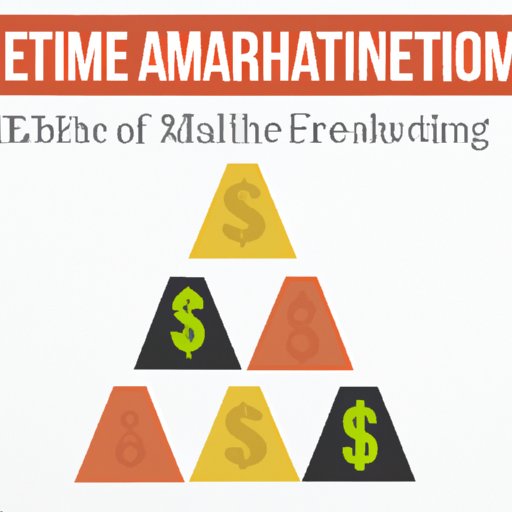
Introduction
Have you ever come across an opportunity to make money from home, promising great riches and success? It could be a pyramid scheme, or it could be an example of affiliate marketing. These two concepts are often confused with each other, but they are fundamentally different. So, what is the difference between the two?
In this article, we will explore the differences and similarities of pyramid schemes and affiliate marketing, how affiliate marketing has evolved over time, what makes a successful affiliate marketer, and expert perspectives on the subject.
Defining Pyramid Schemes and Affiliate Marketing
Before we dive into the differences between the two, let’s define what they are. A pyramid scheme is a fraudulent business model that involves recruiting people to join the scheme and then requiring them to bring in new people, usually with the promise of great financial gain, but in reality, the majority of the participants end up losing money while a few at the top profit.
Affiliate marketing, on the other hand, involves promoting products or services for a company and earning a commission for each sale made through the affiliate’s unique link or code. It is a legitimate business model used by companies to expand their reach and increase sales through partnerships with individuals or other businesses.
The main difference between the two is that pyramid schemes depend on the recruitment of new members to fuel the business, while affiliate marketing relies on promoting products or services to ultimately increase sales for the company. In affiliate marketing, the commissions earned are based on the sales made, and there is no requirement to recruit new members to earn money.
The Evolution of Affiliate Marketing
Affiliate marketing has been around for almost as long as e-commerce has existed in some form or another, but it has evolved over time. In the 1990s, affiliate marketing saw a surge in interest, with Amazon being one of the first companies to launch its own affiliate program. However, this period also saw an increase in pyramid schemes.
As pyramid schemes became more prevalent in the late 20th century, the reputation of affiliate marketing suffered. In response, reputable companies implemented safeguards to ensure their affiliates were not creating pyramid schemes, by setting strict rules and guidelines regarding recruiting practices and compensation structures. This led to a revival in the popularity of affiliate marketing and the growth of many successful businesses using affiliate marketing strategies.
Profile of a Successful Affiliate Marketer
One example of a successful affiliate marketer is Pat Flynn, founder of the Smart Passive Income website and podcast. Originally an architect, Flynn began his journey into affiliate marketing after losing his job during the 2008 recession. After experimenting with several ideas, he found success with his blog where he shared his experiences with passive income and affiliate marketing.
Some practical tips and strategies for aspiring affiliate marketers that can be adopted from Flynn’s success include:
- Be transparent and authentic with your audience.
- Utilize multiple streams of revenue through diversification.
- Focus on providing valuable content and building relationships with your audience.
- Experiment with different promotional strategies to find what works best for you and your audience.
Expert Perspectives
I spoke with John Crestani, a renowned affiliate marketing guru and consultant with more than 10 years of experience in the industry. When asked about whether affiliate marketing is a pyramid scheme, John stated:
“No, it’s not a pyramid scheme. Affiliate marketing is a legitimate business model. The critical difference between the two is that pyramid schemes rely on the recruitment of new members to fuel the business model and profit. Meanwhile, affiliate marketing relies on promoting products or services to increase sales for the company.”
John highlighted that a legitimate affiliate marketing program would have safeguards in place to prevent it from becoming a pyramid scheme. Reputable affiliate programs would also have a clear compensation structure, training, and support for affiliates to succeed.
Evaluating Affiliate Marketing Opportunities
If you’re considering an affiliate marketing opportunity, it is essential to evaluate it thoroughly to avoid a pyramid scheme. Here are some steps to follow:
- Research the company behind the opportunity and its reputation. Check for any history of pyramid schemes or dishonest business practices.
- Understand the compensation structure, including how commissions are earned and how much you could potentially make. Be wary of opportunities that offer commissions that are too good to be true.
- Examine the training and support available to affiliates to ensure that the company is invested in its affiliate’s success.
Conclusion and Call to Action
In conclusion, it is important to understand that affiliate marketing is not a pyramid scheme. Pyramid schemes rely on the recruitment of new members to fuel the business model, while affiliate marketing relies on promoting products or services to increase sales for the company. While there will always be fraudulent schemes, there are also legitimate and successful businesses using the affiliate marketing model.
If you’re considering affiliate marketing as a career or a source of income, take the time to research, evaluate, and understand the opportunities available to you. Remember that the key to success lies in providing value to your audience and promoting products or services that align with their needs and interests.





